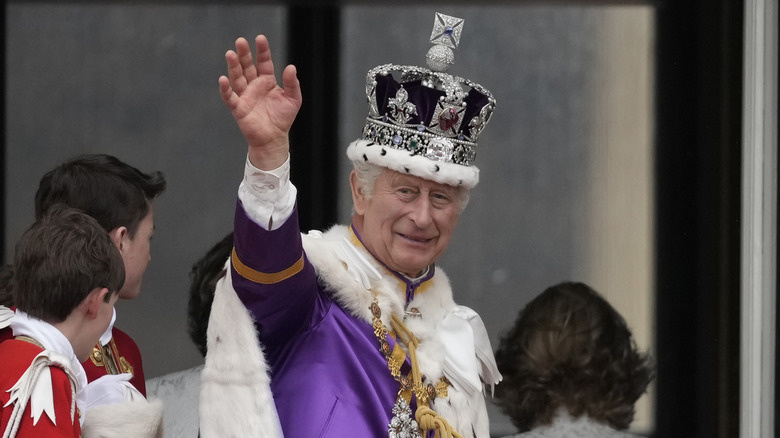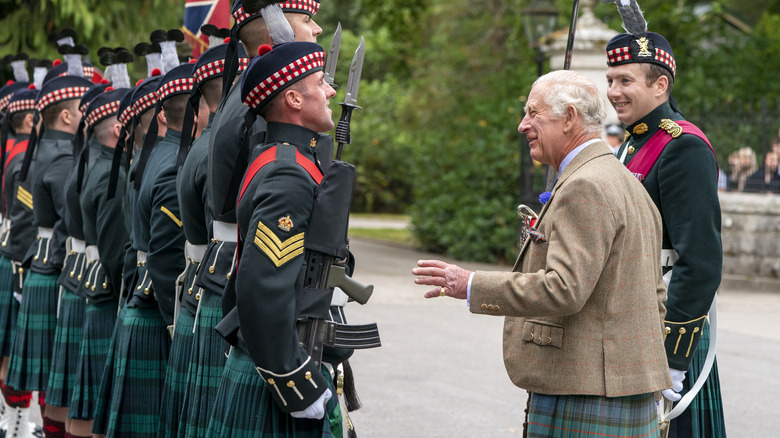Expert Tells Us How King Charles' Body Language Has Changed Since The Queen's Death
It's difficult to believe it's already been a year since the heartbreaking death of Queen Elizabeth II, especially since so much has happened in the royal family in these brief 12 months. Between the release of Prince Harry's memoir "Spare," the jewel-studded coronation of King Charles III, and drama surrounding Prince Andrew's fall from grace, it's been a wild year for royal watchers. That said, no one in the royal family has likely experienced more change in the wake of the Queen's passing than Charles himself.
King Charles waited longer than any previous British monarch to take the throne, making him the oldest person to ever ascend the throne of England. As such, he lived the majority of his life as Prince Charles, a role that he grew ever more comfortable embodying as the years passed. In fact, that was his identity for 73 years. And while he had been groomed and prepared all his life to become King, changing jobs at 73 is bound to be a challenge, no matter who you are.
We spoke with Jess Ponce III, body language expert, communication coach, and author of the book "A.W.E.S.O.M.E.: Seven Keys to Unlocking the Speaker Within," to learn how King Charles' shifting body language can give us insight into how he has changed since his mother's death and his own ascension to the role of king.
King Charles III as Charles, Prince of Wales
King Charles III served as the Prince of Wales for many decades, and by the time Queen Elizabeth II reached the milestone of her Platinum Jubilee, it was a role that came as easily as breathing to him. At least that's what his demeanor at the time tells body language expert Jess Ponce.
After watching the speech that Charles gave in honor of his mother at the Platinum Jubilee celebration, Ponce told us, "Not only is Prince Charles charming and witty, he is regal during this speech. You can tell he is someone who has spent his life in the public's eye and was raised for events like this."
He went on to say that his speech was well prepared and apt and that his delivery was perfectly on point. "His gestures," he elaborated, "Specifically, his meticulous upward hand movements show confidence. He is certain and comfortable. He is in his element, owns his role as the son of England, and wears it with ease. He is loyal not only to his mother but to the country and the part his family plays in it. He appropriately showed up exactly as he needed to in this moment."
King Charles III's first address after the Queen's passing
Queen Elizabeth II passed away at Balmoral Castle in Scotland on September 8, 2022. Shortly thereafter, the responsibility of addressing Britain fell to King Charles III, who gave a live televised speech while seated beside a framed portrait of his mother (via NBC News). He had the unique challenge of speaking both as a bereft son and also as the newly minted head of the nation.
"This is one of King Charles' shining moments," Jess Ponce says. "He was both appropriately royal and deeply personal." Ponce pointed out that, "Occasionally when he spoke of the Queen's impact, his eyes would close briefly, just for a second. This is a sign of emotion and respect for both the mom he loved and the figurehead he revered. His cadence was assuring and warm. He was the leader we needed him to be in this moment — and a clear sign of the leader he would become."
Ponce went so far as to call this speech Charles' "strongest appearance to date" because through it the audience could "begin to see in real-time the transformation of Prince into King ... Whereas before he was merely a figure in the royal family, he was now the leader of it," he said. "This was a turning point moment for King Charles and will go down as one of his most unifying moments — a moment when we needed someone to comfort and bring us together, just as he did."
A Prince becomes a King
Just weeks before his coronation on May 6, 2023, King Charles III once again addressed the nation, but this time, he did so quite differently from the address given in the wake of his mother's passing. This speech was his official Commonwealth Day speech, and as Jess Ponce pointed out to us, Charles, who was the king-in-waiting at the time, had two different agendas to follow. "The first," Ponce said, "was to honor his mom," which he had already done a beautiful job of in the speech he gave after her passing.
The second agenda, as Ponce put it, was to "get down to business." In other words, it was time to discuss "here's what needs to get done," as the leader of the United Kingdom. Ponce felt that Charles "handled both [agendas] appropriately. But overall, it was a formal moment that will be noted as unremarkable in years to come." Unlike the emotion that was palpable in his body language and in his voice in his previous address, this speech was written simply.
"Now, don't get me wrong," Ponce assured us, "he was appropriate and quite articulate in his address. The moment, however, did not have the weight of previous addresses. This was more a business-as-usual address." This isn't necessarily a bad thing, however; it demonstrated that Charles, even in the wake of so much personal turmoil, was able to focus clearly on the task at hand: leading the country.
A year after the Queen's death, King Charles III has changed
In August 2023, King Charles III and his family returned to Balmoral in Scotland for the first time since Queen Elizabeth II passed away there in September 2022. The family's vacation coincided very closely with the first anniversary of Queen Elizabeth's death, and when he was welcomed back to Balmoral, the weight of the moment was not lost on the King.
During the official welcome, during which Scottish troops in traditional dress greeted King Charles with a demonstration and music, Charles appeared comfortable with a barely-there gentle smile. Jess Ponce told us that Charles' demeanor at this event demonstrated that in spite of all the changes, he is still himself. "Throughout his life, we have seen King Charles in public settings. Such as addressing the public, attending an event, or meeting with dignitaries or citizens of England," he told us. "In all of these settings, he is royal and appropriate. Yet, he is consistently understated."
Ponce mused that "This might be in part because we have seen him as a prince for so many years, and not as king. He is not someone who physically has a strong, noble stature. However, when he engages others with his warm smile, you see everyone around him light up. And it will be this more personal touch that will make his reign as king stand out."
Charles has become a King, but is still himself
In fact, Jess Ponce sees King Charles III's uncharacteristic warmth, his casual and personable nature, and his ability to appear dignified while also very human might just be King Charles' greatest strength. He explained to us, "When we hear him speak and when we see him engage others, we experience him at his best. That is the king we need to see — so maybe unlike others who led the royal family in the past, this is where we can see him shine the most."
So, while King Charles does maintain a great deal of the warmth and social personality he had as Prince of Wales, Ponce feels we should make no mistake that, "The King has evolved from a prince into a world-class leader. His strength is when he speaks and addresses people. Put him on stage and the performer within takes over. He's likable and warm." If he had a piece of advice for King Charles, Ponce said he would suggest to him that he "allow that warm to burn through."

